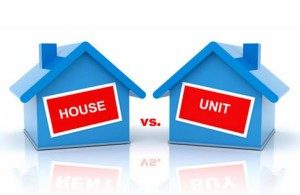a unit or house?
Are you trying to decide between making an investment in a unit or a house? Well, take a step back, because there are a few key factors that you should consider first.
Initial cost
Units are generally more affordable. Buying a house has a higher entry price point due to the land value.
Ongoing expenses
Council rates are usually higher on a house and you’ll be required to pay land taxes on an ongoing basis. With a unit, you will have to account for strata fees quarterly for the life of the investment, including any special levies that may be raised.
Maintenance
If you own a house, all maintenance issues are your responsibility (unless you have a property manager), whereas the maintenance and care of a unit building and surrounds is the responsibility of the body corporate (you will need to cover any internal maintenance.
Investment opportunity
A house generally offers higher capital growth. Units, on the other hand, tend to offer higher rental yields so they are more favourable from a cash flow perspective.
A house will typically offer many more options to increase capital value and rent yield, like adding a deck or bedroom or enclosing the carport into a garage.
Typically a rental unit returns a lower yield than that of a house and the demand from tenants for a unit is greater than for a house.
Rentability
Both houses and units are in demand right now. To optimise your investment, look for places where rental demand is high, such as around universities, transport or lifestyle areas with easy access to schools, parks, cafes, shops or beaches.
A successful investment is dependent on first and foremost the state of the market, secondly, the social and economic development factors surrounding your investment and thirdly, your own individual financial position, risk profile and investment strategy.



